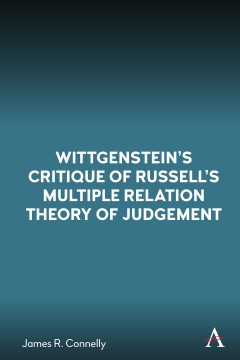Wittgenstein’s Critique of Russell’s Multiple Relation Theory of Judgement
By James R. Connelly
- About This Book
- Reviews
- Author Information
- Series
- Table of Contents
- Links
- Podcasts
About This Book
Wittgenstein’s May–June 1913 critique of Russell’s multiple-relation theory of judgement (or MRTJ) marked a crucial turning point in the lives of two great twentieth-century thinkers. But it was also a watershed moment within the history of analytic philosophy itself. The critique led Russell to abandon his 1913 Theory of Knowledge manuscript and left a significant breach within his epistemology. It represented an important milestone within Wittgenstein’s philosophical development and marked the point at which he emerged on the scene as an independent philosophical force. It inaugurated the linguistic turn in twentieth-century philosophy which would dominate the course of analytic philosophy throughout the early and middle part of that century. For these and other reasons, it is worthy of careful study and deep understanding.
Yet scholarly consensus around a satisfactory interpretation of the nature of the critique, the extent of and reasons for its impact on Russell, along with the role it played within Wittgenstein’s developmental trajectory have remained elusive. This partly reflects the fact that a correct interpretation of Wittgenstein’s critique depends upon a satisfactory resolution of several other, related exegetical controversies within the interpretation of Russell’s and Wittgenstein’s respective philosophies.
With these facts in mind, this book aims to accomplish four interrelated goals. The first is to develop a compelling reading of Wittgenstein’s May–June 1913 critique of Russell’s MRTJ. For reasons which will become clear over the course of the book, this reading is called the ‘logical interpretation’ (or LI). The second main objective of the book is to defend LI against its most prominent competitors in the scholarly literature. These include interpretations of Wittgenstein’s objection offered by Nicholas Griffin and Steven Sommerville, Gregory Landini, Graham Stevens, Peter Hanks, Christopher Pincock, Rosalind Carey, Fraser MacBride and Samuel Lebens. Third, the book aims to situate Wittgenstein’s critique of the MRTJ and Russell’s reaction to it, within the broader context of each of Wittgenstein’s and Russell’s respective philosophical developments. While much scholarship has focused on probing the role played by the objection within the evolution of Russell’s thought, much less has been done to explore the impact on Wittgenstein’s development. Still less, if any scholarship has been devoted to highlighting the significant traces of Wittgenstein’s critique which can be found latent within his later philosophical viewpoint. This book seeks to fill these lacunae in the scholarship on Wittgenstein while also adding to the high-quality work on Russell which has already been done in this area. Fourth and finally, the book aims to introduce students and scholars of early analytic philosophy to and familiarize them with the historical events, textual evidence, scholarly controversies, letters, notes and diagrams, consideration of which is integral to constructing a plausible reading of Wittgenstein’s objection. To that end, it brings together a broad selection of relevant materials and information in a clear, accessible and organized way into one, relatively concise source.
Reviews
“This is the first comprehensive book length treatment of Wittgenstein’s critique of Russell’s multiple relation theory of judgment. Connelly covers all of the historical and philosophical issues surrounding Wittgenstein’s critique and offers a new and deeply interesting interpretation. It is a masterful achievement.” —Peter Hanks, Professor and Chair, Department of Philosophy, University of Minnesota, USA
“This book is an insightful and illuminating study, combining a rich critical summary of existing interpretations and an interesting new account. It is essential reading for all students and scholars of the Russell–Wittgenstein dispute concerning the nature of judgement” —Graham Stevens, Head of Philosophy Department, School of Social Science, University of Manchester, UK
“James Connelly first conducts an expert tour through elusive primary sources and voluminous secondary literature in order to advance his own distinctive interpretation of the philosophical confrontation that waged between Russell and Wittgenstein in 1913. Secondly, Connelly demonstrates the ongoing and much-overlooked influence that this confrontation had over the evolution of Wittgenstein’s own philosophical development. For both of these reasons, Connelly has made a vital contribution to the history of early analytic philosophy.” —Samuel Lebens, Research Fellow, University of Haifa, Israel
Connelly’s expert and clear presentation, all in one book, of all of the key interpretations in the literature, and all of the relevant scraps of evidence, constitutes a significant contribution to scholars and students alike. —Journal for the History of Analytical Philosophy
Connelly’s interpretation is sophisticated, supported by textual evidence that is painstakingly researched, and makes a very welcome addition to the literature. He is to be especially commended on the charitable and generous approach he takes to previous interpretations. [...] As a nearly exhaustive summary of the competing interpretations of Russell’s paralysis, and the competing interpretations of his philosophy that generate them, it will be welcomed by all students and scholars of Russell’s work. —Russell: the Journal of Bertrand Russell Studies
Author Information
James R. Connelly is an associate professor at Trent University Durham-GTA in Oshawa, ON, Canada. His research focuses on the history of analytic philosophy, philosophy of language, Wittgenstein and Russell.
Series
Anthem Studies in Wittgenstein
Table of Contents
List of Common Abbreviations; Introduction; Chapter 1: Historical and Philosophical Background; Chapter 2: The Scholarly Controversy; Chapter 3: Russell’s Paralysis; Chapter 4: Wittgenstein on Truth, Logic and Representation.
Links
Stay Updated
Information
Latest Tweets



